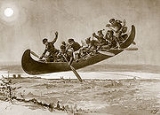
Folklore
Overview
Music
Music is an art form whose medium is sound and silence. Its common elements are pitch , rhythm , dynamics, and the sonic qualities of timbre and texture...
, oral history
Oral history
Oral history is the collection and study of historical information about individuals, families, important events, or everyday life using audiotapes, videotapes, or transcriptions of planned interviews...
, proverb
Proverb
A proverb is a simple and concrete saying popularly known and repeated, which expresses a truth, based on common sense or the practical experience of humanity. They are often metaphorical. A proverb that describes a basic rule of conduct may also be known as a maxim...
s, joke
Joke
A joke is a phrase or a paragraph with a humorous twist. It can be in many different forms, such as a question or short story. To achieve this end, jokes may employ irony, sarcasm, word play and other devices...
s, popular beliefs
Superstition
Superstition is a belief in supernatural causality: that one event leads to the cause of another without any process in the physical world linking the two events....
, fairy tales and customs that are the tradition
Tradition
A tradition is a ritual, belief or object passed down within a society, still maintained in the present, with origins in the past. Common examples include holidays or impractical but socially meaningful clothes , but the idea has also been applied to social norms such as greetings...
s of a culture, subculture
Subculture
In sociology, anthropology and cultural studies, a subculture is a group of people with a culture which differentiates them from the larger culture to which they belong.- Definition :...
, or group
Group (sociology)
In the social sciences a social group can be defined as two or more humans who interact with one another, share similar characteristics and collectively have a sense of unity...
. It is also the set of practices through which those expressive genres are shared. The study of folklore is sometimes called folkloristics
Folkloristics
Folkloristics is the formal academic study of folklore. The term derives from a nineteenth century German designation of folkloristik to distinguish between folklore as the content and folkloristics as its study, much as language is distinguished from linguistics...
. The word 'folklore' was first used by the English antiquarian William Thoms
William Thoms
William John Thoms was a British writer credited with coining the term "folklore" in the 1840s. Thoms's investigation of folklore and myth led to a later career of debunking longevity myths...
in a letter published in the London journal The Athenaeum in 1846. In usage, there is a continuum between folklore and mythology
Mythology
The term mythology can refer either to the study of myths, or to a body or collection of myths. As examples, comparative mythology is the study of connections between myths from different cultures, whereas Greek mythology is the body of myths from ancient Greece...
.

